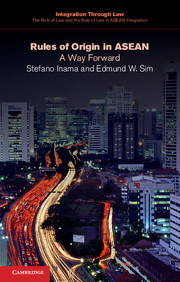Book contents
- Frontmatter
- Contents
- List of Tables
- General Editors’ preface
- Preface
- List of Abbreviations
- Chapter 1 Introduction
- Chapter 2 The initial set of ASEAN rules of origin: the lack of clarity and transparency masquerading as simplicity 1992–1995
- Chapter 3 Externalizing the confusion: the proliferation of rules in the ASEAN FTAs with dialogue partners
- Chapter 4 The silent cost: the cumbersome administration of ASEAN rules of origin
- Chapter 5 The possible way forward: self-certification
- Chapter 6 Conclusion and recommendations
- Executive Summary
- Appendices
- Appendix 1 1992 Agreement on the Common Effective Preferential Tariff Scheme for the ASEAN Free Trade Area
- Appendix 2 Rules of Origin for the CEPT
- Appendix 3 2009 ASEAN Trade in Goods Agreement
- Appendix 4 ATIGA Annex 3, Attachment 1 Substantial Transformation Criterion for Textiles and Textile Products
- Appendix 5 ATIGA Annex 5 Principles and Guidelines for Calculating Regional Value Content on the ATIGA
- Appendix 6 ATIGA Annex 6 Implementing Guidelines for Partial Cumulation under Article 30(2) on ASEAN Cumulative Rules of Origin
- Appendix 7 ATIGA Form D
- Appendix 8 ATIGA Annex 8 Operational Certification Procedure for the Rules of Origin under Chapter 3
- Appendix 9 Rules of Origin, ASEAN–Australia–New Zealand Free Trade Agreement
- Appendix 10 Rules of Origin, ASEAN–China Free Trade Agreement
- Appendix 11 Rules of Origin, ASEAN–India Free Trade Agreement
- Appendix 12 Rules of Origin, ASEAN–Japan Comprehensive Economic Partnership Agreement
- Appendix 13 Rules of Origin, ASEAN–Korea Free Trade Agreement
- Bibliography
- Index
Appendix 5 - ATIGA Annex 5 Principles and Guidelines for Calculating Regional Value Content on the ATIGA
Published online by Cambridge University Press: 05 March 2015
- Frontmatter
- Contents
- List of Tables
- General Editors’ preface
- Preface
- List of Abbreviations
- Chapter 1 Introduction
- Chapter 2 The initial set of ASEAN rules of origin: the lack of clarity and transparency masquerading as simplicity 1992–1995
- Chapter 3 Externalizing the confusion: the proliferation of rules in the ASEAN FTAs with dialogue partners
- Chapter 4 The silent cost: the cumbersome administration of ASEAN rules of origin
- Chapter 5 The possible way forward: self-certification
- Chapter 6 Conclusion and recommendations
- Executive Summary
- Appendices
- Appendix 1 1992 Agreement on the Common Effective Preferential Tariff Scheme for the ASEAN Free Trade Area
- Appendix 2 Rules of Origin for the CEPT
- Appendix 3 2009 ASEAN Trade in Goods Agreement
- Appendix 4 ATIGA Annex 3, Attachment 1 Substantial Transformation Criterion for Textiles and Textile Products
- Appendix 5 ATIGA Annex 5 Principles and Guidelines for Calculating Regional Value Content on the ATIGA
- Appendix 6 ATIGA Annex 6 Implementing Guidelines for Partial Cumulation under Article 30(2) on ASEAN Cumulative Rules of Origin
- Appendix 7 ATIGA Form D
- Appendix 8 ATIGA Annex 8 Operational Certification Procedure for the Rules of Origin under Chapter 3
- Appendix 9 Rules of Origin, ASEAN–Australia–New Zealand Free Trade Agreement
- Appendix 10 Rules of Origin, ASEAN–China Free Trade Agreement
- Appendix 11 Rules of Origin, ASEAN–India Free Trade Agreement
- Appendix 12 Rules of Origin, ASEAN–Japan Comprehensive Economic Partnership Agreement
- Appendix 13 Rules of Origin, ASEAN–Korea Free Trade Agreement
- Bibliography
- Index
Summary
A. Principles to Determine Cost for Regional Value Content
Materiality – all cost material to the evaluation, assessment and determination of origin;
Consistency – costing allocation method should be consistent unless justified by commercial reality;
Reliability – costing information must be reliable and supported by appropriate information;
Relevance – costs must be allocated based on objective and quantifiable data;
Accuracy – costing methodology should provide an accurate representation of the cost element in question;
Application of GAAP of the exporting country – costing information must be prepared in accordance with the generally accepted accounting principles and this includes the avoidance of double-counting of cost items;
Currency – updated costing information from existing accounting and costing records of companies should be used to calculate origin.
B. Guidelines for Costing Methodologies
Actual Costs – basis for actual costs should be defined by the company. Actual costs should include all direct and indirect costs incurred in producing the product;
Projected and Budgeted Costs – projected costs may be used if it is justified. Companies should provide variance analysis and proof during the period origin is claimed to indicate accuracy of projections;
Standards Costs – the basis for standards costs should be indicated. Companies should provide evidence that the costs are used for accounting purposes;
Average/Moving Average Costs – average costs may be used if justified; the basis for calculating average costs, including time period, etc. should be highlighted. Companies should provide variance analysis and proof during the period origin is claimed to indicate accuracy of average costs;
Fixed Costs – fixed costs should be apportioned according to sound cost accounting principles. They should be a representative reflection of unit costs for the company in the particular period in question. The method for apportionment should be indicated.
- Type
- Chapter
- Information
- Rules of Origin in ASEANA Way Forward, pp. 197 - 198Publisher: Cambridge University PressPrint publication year: 2015



